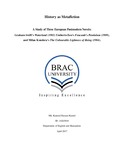History as metafiction: a study of three European postmodern novels, Graham Swift’s Waterland (1983), Umberto Eco’s Foucault’s Pendulum (1989), and Milan Kundera’s The Unbearable Lightness of Being (1984).

View/
Date
2017-04Publisher
BRAC UniversityAuthor
Kamol, Md. Kamrul HassanMetadata
Show full item recordAbstract
The aim of this paper is to examine how postmodern novels self-consciously synchronize history in fiction. To be more precise, how and why history has been used in metafictional dimension as a postmodern discourse. In order to discuss the idea of history as metafiction, this paper has attempted to present a background of modernism and it’s legacies; and how postmodernism emerged as an cultural phenomenon. History is a contested idea, and how postmodernism approaches the idea of history is also discussed to clarify why metafictional writing is significant to postmodern discourse. And lastly to illustrate the idea of history as metafiction this paper consolidates on three novels Waterland (1983), Foucault’s Pendulum (1989) and The Unbearable Lightness of Being (1984).
Keywords
History; Metafiction; Postmodern novel; Europe; Waterland; Foucault’s Pendulum; The Unbearable Lightness of Being; Graham Swift; Umberto Eco; Milan KunderaDescription
This thesis is submitted in partial fulfillment of the requirements for the degree of Masters of Arts in English, 2017.Department
Department of English and Humanities, BRAC UniversityType
ThesisCollections
- Thesis, B.A. (English) [624]
